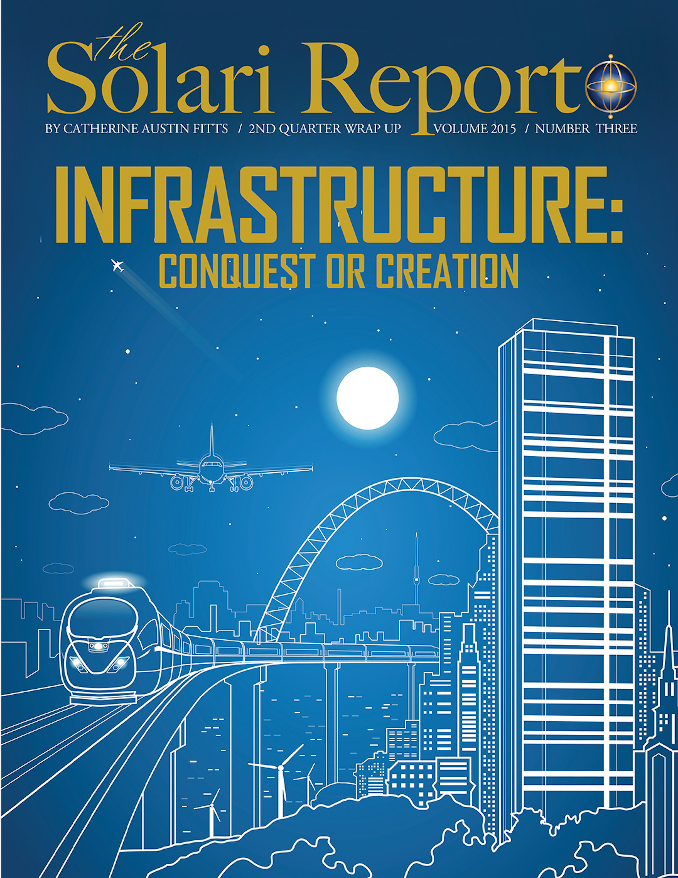
Read the Book
Read the book version of the 2nd Quarter Wrap Up – Infrastructure: Conquest or Creation? Here (PDF)
Read the Web Presentation
Read the web presentation for the Q2 Wrap Up
Listen to the Wrap Up MP3 audio file
Download the Wrap Up audio file
Audio Chapters
Introduction Audio Catherine introduces the 2015 2nd Quarter Wrap Up with a focus on the world’s infrastructure.
Infrastructure Audio Catherine takes a look at the history of infrastructure as both a cultural and logistical tool.
Infrastructure in the News Audio Catherine explains why infrastructure is such a hot topic.atherine explains why infrastructure is such a hot topic.
Unique Trends to Consider Audio Catherine explains some of the interesting trends that are occurring.
Governance: The Make or Break Question Audio Catherine looks at some of the critical issues against infrastructure development.
The Intimate Opportunity: Just Do It Infrastructure Audio How to take advantage of the development of infrastructure.
Standing at the Crossroads: Conquest or Creation Audio Catherine looks at the risks.
Closing Audio Catherine closes out the 2nd Quarter Wrap Up.
Listen to the Money & Markets MP3 audio file
Download the Money & Markets audio file
“Nowadays, people will go anywhere to avoid paying tax. A quick visit to Lichtenstein, Monaco, maybe Jersey; empty the vaults of private wealth, and you could write off the world’s debt. In a day, in an hour, in a minute. Three-quarters of the world’s cash is hidden away in places exactly like this.” ~CIA agent in Turks & Caicos, Part II of The Worricker Trilogy
by Catherine Austin Fitts
There is a war going on – between the forces of control and conquest and the forces of collaboration and creation. History teaches us that the civilizations which win at either generally get their infrastructure right. In fact, infrastructure may be the difference between the life and death, the prosperity and poverty of a civilization.
The United States has spent a great deal of money on infrastructure in recent decades and much of this spending relates to control and conquest. US telecommunications infrastructure is less reliable (and more expensive) than that of other developed countries – but it permits the NSA and a variety of private parties to collect and access intelligence. US software is often buggy, but “trapdoors” provide access to intelligence agencies. In many areas, US roads and bridges are badly in need of repair, but we have poured significant sums into secret underground bases.
The United States has also developed a reputation for destroying infrastructure – whether destroying that of Iraq or other countries we invade – or decimating global communities with predatory lending and financial speculation which cause severe dislocations in local capital allocations.
Frustrated with the US, the IMF, the World Bank and traditional global financial institutions, the developing world is taking matters into its own hands by launching and financing mechanisms for significant infrastructure investment.
The BRICS nations are acutely aware that prosperity and environmental responsibility depend on significant and cost-effective investment in infrastructure. Opportunities to improve global connections – via air, rail, roads, pipeline, phone, or space – and to integrate new materials and technologies beckon.
China’s successful launch of the Asian Infrastructure Investment Bank has brought these questions front and center. In this week’s Second Quarter Wrap Up, I will explore this subject and its implications for US leadership.
The United States has produced a generation of leaders who have risen to power by cashing in on globalization – on natural resources in the developing markets and cheap debt – and relying heavily on the superiority of our weaponry. If you look at what must be done to succeed on the road ahead, we can ill afford such leadership now. As The Economist stated recently, “America’s aristocracy is calcifying.”
The BBC’s outstanding, three-part series from David Hare, The Worricker Trilogy, offers entertaining insights on this subject. In the series, The Gladstone Group, a syndicate of New Jersey businessmen and investors, are grossly over-billing the CIA for the construction of secret torture and rendition sites. A portion of this “padding” provides kickbacks to a global foundation to be launched by the British prime minister upon retirement (shades of Tony Blair?). This foundation’s stated goals are “humanitarian works.”
The Worricker Trilogy raises a critical question. We have piled up trillions of dollars in offshore havens and the bond markets. Now we must reinvest this money in the real economy. However, the real economy cannot produce significant returns without significant infrastructure. The long-term bull market in bonds and quantitative easing are over.
Political kickbacks schemes may have worked for engineering the financial coup d’etat and accessing natural resources and privatizations in the developing and frontier markets. However, it will not work for reinvesting in strategic infrastructure investment that Mr. Global wants going forward. Nor will skimming from Mr. Global (as opposed to for Mr. Global) be tolerated.
China’s leadership has primarily been trained as engineers. Engineers build bridges, high-speed trains, power and desalination plants and spaceships.
The US leadership largely consists of wealthy lawyers. Lawyers make rules, pass laws and litigate – and some of their laws create tax loopholes to fund global foundations and endowments.
Which do you think we need?
This week, I will also discuss Q2 news stories and financial markets.
Talk to you Thursday! If you’re not a subscriber yet, learn more about becoming one here.

